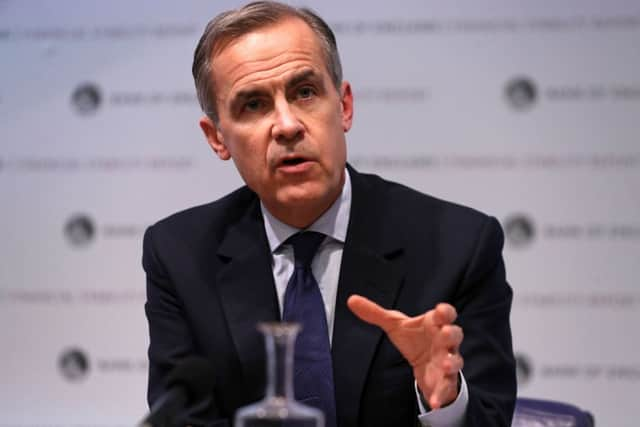No-deal Brexit warning from Bank of England: '˜Pound will crash and inflation will soar'
The pound would crash, inflation would soar, interest rates would have to rise and Britain’s growth would plummet in the event of a disorderly exit from the EU, the Bank’s analysis has found.
The apocalyptic outcome would also see unemployment skyrocket. Under the worst case scenario outlined by the Bank, a no-deal Brexit without a transition period would see UK GDP could fall by 8 per cent, sparking the worst recession since 1921.


Advertisement
Hide AdAdvertisement
Hide AdThe unemployment rate would rise 7.5 per cent, inflation would surge to 6.5 per cent while interest rates would rise as high as 5.5 per cent. House prices would decline by 30 per cent, while commercial property prices would fall by 48 per cent. The pound would drop by a quarter, below the value of the both the US dollar and the euro.
“These scenarios are not forecasts,” Bank of England Governor Mark Carney said. “They illustrate what could happen, not necessarily what is most likely to happen.
“Taken together the scenarios highlight that the impact of Brexit will depend on the direction, magnitude and speed of the effect of reduced openness of the UK economy.
“The direction of the effects of reduced openness is clear: lower supply capacity, weaker demand, a lower exchange rate, and higher inflation.”
However, the analysis concludes that Britain’s banking system can “withstand even a severe economic shock” following tests of banks’ financial resilience. Major British banks have “ample liquidity to withstand a major market disruption,” Mr Carney said. “They hold more than
£1 trillion of high-quality liquid assets and can access an additional £300 billion of liquidity through the Bank of England’s regular facilities.
“Major UK banks now can withstand many months without access to wholesale or foreign exchange markets”.
The warning was immediately dismissed by leading Brexiteers, with Conservative MP Jacob Rees-Mogg dismissing the Bank’s analysis as “project hysteria”. In a personal attack on Mr Carney, he called the Governor “a failed, second-rate Canadian politician who is talking down the pound”.
Advertisement
Hide AdAdvertisement
Hide Ad“I am unaware of the Bank before Mark Carney’s time behaving this way,” Mr Rees-Mogg said. “They tried project fear before, they were wrong. They are now trying project hysteria and they are looking deeply foolish.”
Despite its stark message, the Bank’s analysis will be welcomed by Theresa May as she tries to convince sceptical MPs to back her EU withdrawal agreement in a vote scheduled for 11 December.
The government has warned MPs that voting against the Prime Minister’s deal risks sending the UK crashing out of the EU in March next year without any deal at all.
However, there was less welcome news for the government in its own impact assessment, which emerged hours before the Bank’s doomsday report.
The government’s impact assessment found that withdrawal from the EU under Mrs May’s plans could cut the UK’s GDP by up to 3.9 per cent over the next 15 years.
Even if negotiations on UK-EU trade secure everything the Prime Minister is asking for, the economy would still be 2.5 per cent smaller, government officials found.
Their analysis concludes that lower immigration will harm the UK economy, with the impact on GDP being 1.8 per cent worse if net migration from European Economic Area (EEA) countries falls from current levels to zero.
By contrast, staying in the single market via membership of the EEA would leave the economy 1 per cent smaller after 15 years.
Advertisement
Hide AdAdvertisement
Hide AdThe UK government’s modelling assumes that all existing EU trade deals are transferred into new UK agreements, a process that has only just begun.
It also assumes trade deals are struck with a range of new partners, including Australia, New Zealand and members of the Trans-Pacific Partnership agreement, as well as a UK-US trade deal.
New trade deals would have a very small positive impact on UK GDP of just 0.1 per cent, outweighed by the negative impact on the economy, the document reveals. Freeing the UK from EU regulations would also add just 0.1 per cent to GDP.
Wages would fall by an estimated 2.7 per cent after 15 years under the model closest to the proposed deal, and by 10 per cent under a no-deal scenario.
Responding to the Bank of England’s findings,
Shadow Chancellor John McDonnell said: “Instead of ploughing on with this discredited deal the government should set new priorities that would protect jobs and the economy.”
The SNP’s Europe spokesman Stephen Gethins said that despite the warning from the Bank, the government’s insistence that the choice was between its deal and no deal was a “myth”.
“There is no majority in the House of Commons for either of these outcomes – so we need to stop wasting time and start talking about the serious alternatives,” Mr Gethins said.
